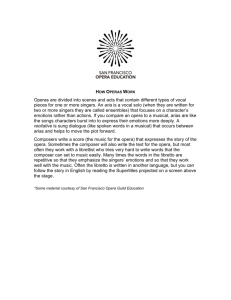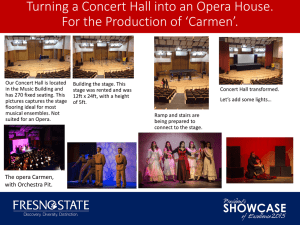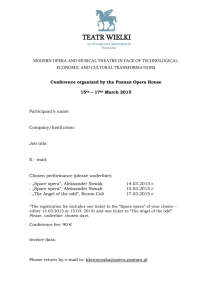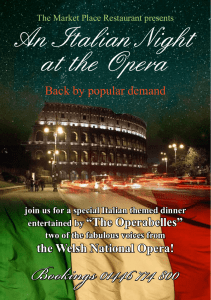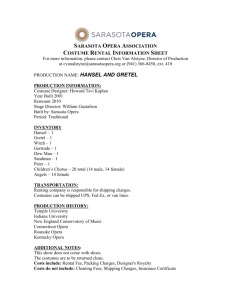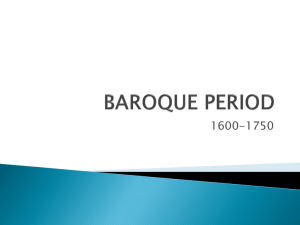Document 14171541
advertisement
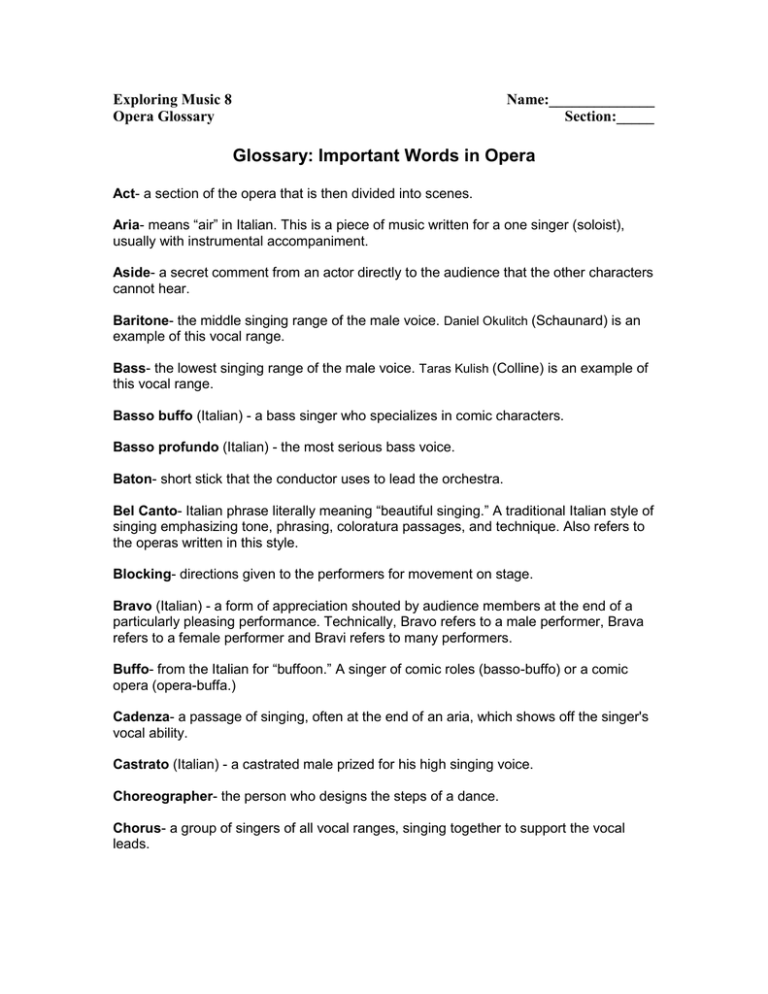
Exploring Music 8 Opera Glossary Name:______________ Section:_____ Glossary: Important Words in Opera Act- a section of the opera that is then divided into scenes. Aria- means “air” in Italian. This is a piece of music written for a one singer (soloist), usually with instrumental accompaniment. Aside- a secret comment from an actor directly to the audience that the other characters cannot hear. Baritone- the middle singing range of the male voice. Daniel Okulitch (Schaunard) is an example of this vocal range. Bass- the lowest singing range of the male voice. Taras Kulish (Colline) is an example of this vocal range. Basso buffo (Italian) - a bass singer who specializes in comic characters. Basso profundo (Italian) - the most serious bass voice. Baton- short stick that the conductor uses to lead the orchestra. Bel Canto- Italian phrase literally meaning “beautiful singing.” A traditional Italian style of singing emphasizing tone, phrasing, coloratura passages, and technique. Also refers to the operas written in this style. Blocking- directions given to the performers for movement on stage. Bravo (Italian) - a form of appreciation shouted by audience members at the end of a particularly pleasing performance. Technically, Bravo refers to a male performer, Brava refers to a female performer and Bravi refers to many performers. Buffo- from the Italian for “buffoon.” A singer of comic roles (basso-buffo) or a comic opera (opera-buffa.) Cadenza- a passage of singing, often at the end of an aria, which shows off the singer's vocal ability. Castrato (Italian) - a castrated male prized for his high singing voice. Choreographer- the person who designs the steps of a dance. Chorus- a group of singers of all vocal ranges, singing together to support the vocal leads. Classical- the period in music which comes after the Baroque and before the Romantic, roughly from the birth of Mozart to shortly after the death of Beethoven. It represents the greatest standardization in orchestral form and tonality. Coloratura- elaborate ornamentation of music written for a singer using many fast notes and trills. Also used to describe a singer who sings this type of music. Composer- the individual who writes all the music for both voice and instrument. Comprimario (Italian)- a nineteenth century term referring to secondary or supporting roles such as confidantes, messengers, and matchmakers. Contralto- the lowest female voice range. Conductor- the person responsible for the musical interpretation and coordination of the performance. The conductor controls the tempo, the dynamic level and the balance between singers and orchestra. You will see this person standing in the orchestra pit conducting the musicians and the singers. The conductor for La Bohème is Dean Williamson. Countertenor- a male singer with the highest male voice range, generally singing within the female contralto or mezzo soprano range. Crescendo- a build in the volume or dynamic of the music. Cue- a signal to enter or exit from the stage, to move or to change lighting or scenery; or a signal given by the conductor to the musicians. Curtain Call- occurs at the end of the performance when all the cast members and the conductor take bows. This can occur in front of the curtain or on the open stage. Designer- a production can have two or three designers: a lighting designer, a costume designer, a set designer, or someone who is both costume and set designer. They work closely with the stage director to give the production a distinctive look. Diva- literally, “goddess” in Italian. An important female opera star. The masculine form is divo. Dress Rehearsal- the final rehearsal before opening night includes costumes, lights, makeup, etc. Sometimes it is necessary to stop for adjustments, but an attempt is made to make it as much like a regular performance as possible. Duet- music that is written for two people to sing together. Encore- a piece that is performed after the last scheduled piece of a concert. An encore is usually performed because the audience wants to hear more music even though the concert is over. Ensemble- a part of the opera written for a group of two or more singers. This may or may not include the chorus. Falsetto- the upper part of a voice in which the vocal cords do not vibrate completely. Usually used by males to imitate a female voice. Finale- the last musical number of an opera or an act. Grand Opera- spectacular French opera of the Romantic period, lavishly staged, with a historically-based plot, a huge cast, an unusually-large orchestra, and ballet. It also refers to opera without spoken dialogue. Helden- German prefix meaning “heroic”. Can also apply to other voices, but usually used in “heldentenor.” House- the auditorium and front of the theatre excluding the stage and backstage areas. Impresario– the proprietor, manager, or conductor of an opera or concert company; one who puts on or sponsors an entertainment; manager, producer. Interlude- a short piece of instrumental music played between scenes and acts. Intermission- a break between acts of an opera. The lights go on and the audience is free to move around. La Bohème has two intermissions of 20 and 15 minutes respectively. Librettist- the writer of the opera’s text. The librettists for La Bohème are Giuseppe Giacosa and Luigi Illica Libretto- Italian for “little book.” It is the text or story of the opera. Lyric- used to describe a light to medium weight voice with an innocent quality, capable of both sustained, forceful singing and delicate effects. Maestro- means “master” in Italian. Used as a courtesy title for the conductor (male or female). Mark- to sing, but not at full voice. A full-length opera is very hard on a singer’s voice so most performers mark during rehearsals. During the Dress Rehearsal singers try to sing at full voice for part if not all of the rehearsal. Mezzo-soprano- the middle singing range for a female voice. Motif or Leitmotif- a recurring musical theme used to identify an emotion, person, place, or object. Opera- a dramatic presentation which is set to music. Almost all of it is sung, and the orchestra is an equal partner with the singers. Like a play, an opera is acted on stage with costumes, scenery, makeup, etc. Opera is the plural form of the Latin word opus, which means “work.” Opera buffa (Italian) - an opera about ordinary people, usually, but not always comic. First developed in the eighteenth century. Opera seria (Italian) - a serious opera. The usual characters are gods and goddesses, or ancient heroes. Opera-comique (French) or Singspeil (German) - a form of opera which contains spoken dialogue. Operetta- lighthearted opera with spoken dialogue, such as a musical. Orchestra- an ensemble led by a conductor, which is comprised of string, woodwind, brass and percussion instruments. Orchestra pit- sunken area in front of the stage where the orchestra sits. Overture- an orchestral introduction to the opera played before the curtain rises. Usually longer than a prelude and can be played as a separate piece. Pitch- how high or low a note sounds. Prelude- a short introduction that leads into an act without pause. Prima Donna- literally, “first lady” in Italian. The leading woman in an opera. Because of the way some of them behaved in the past, it often refers to someone who is acting in a superior and demanding fashion. The term for a leading man is primo uomo. Principal- a major singing role or the singer who performs such a role. Production- the combination of sets, costumes, props, and lights etc. Props- objects carried or used on stage by the performers. Proscenium- the front opening of the stage which frames the action. Quartet- four singers or the music that is written for four singers. Also quintet, sextet, etc Raked Stage- a stage that slants downwards towards the audience. Recitative- lines of dialogue that are sung, usually with no recognizable melody. It is used to advance the plot. Rehearsal- a working session in which the singers prepare for public performance. Score- the written music of an opera or other musical work. Serenade- a piece of music honoring someone or something, an extension of the traditional performance of a lover beneath the window of his mistress. Soprano- the highest range of the female singing voice. Monica Huisman (Musetta) and Janinah Burnett (Mimì) are examples of this vocal range. Soubrette (French) - pert young female character with a light soprano voice. Spinto (Italian) - a lyric voice that has the power and incisiveness for dramatic climaxes. Stage Areas- refers to the various sections of the stage as seen by those on stage. See diagram in Workshop #1. Stage Director- the person in charge of the action on stage. He or she shows the singers chorus and cast where and when to move and helps them create their characters. The stage director develops a concept for how the entire performance should look and feel. He or she works closely with the stage managers, lighting Designer, set designers, costume designer and wig and make-up artists to make his or her vision into reality. Rob Herriot is the Stage Director for La Bohème Stage Manager- the person who coordinates and manages elements of the performance. The stage manager for La Bohème is Paul Skyrzik. Supernumeraries (Supers) - appear on stage in costume in non-singing and usually, non-speaking roles. Subtitles- the English translations of the opera’s language, in this production Italian, that are projected above the stage during a performance to help the audience follow the story. Much like subtitles in a foreign film. Synopsis- a short summary of the story of the opera. Tableau- occurs at the end of a scene or act, when all cast members on stage freeze in position and remain that way until the curtain closes. It looks as though that moment has been captured in a photograph. Tempo- speed of the music. Tenor- the highest natural adult male voice. Derek Taylor (Rodolfo) is an example of this kind of singing voice. Trill- very quick alternation between two adjacent notes. See coloratura. Trio- an ensemble of three singers or the music that is written for three singers. Trouser role-the role of an adolescent boy or young man, written for and sung by a woman, often a mezzo-soprano. Also known as a pants role. Verismo- describes a realistic style of opera that started in Italy at the end of the 19th century. La Bohème is a verismo opera.
